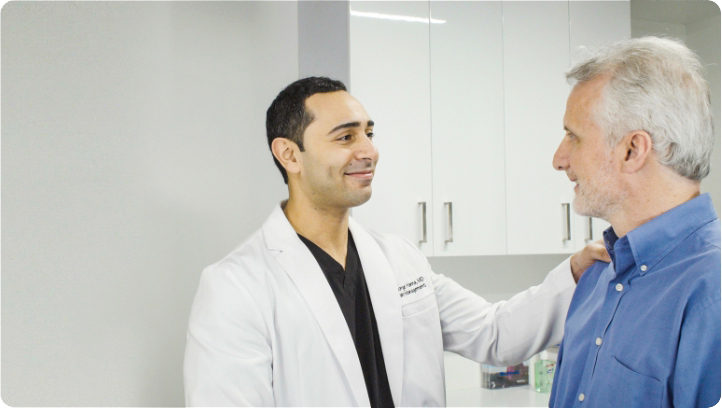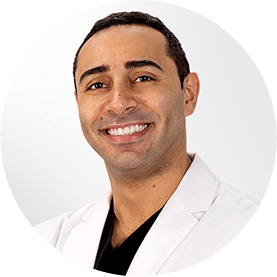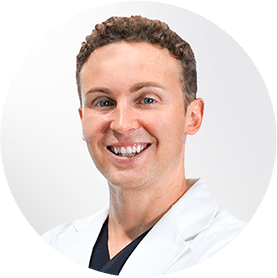Harvard-trained Sciatica Specialist Answers 6 Questions About Radiculopathy
May 31, 2021
Put simply, radiculopathy is the condition used to describe a pinched nerve in the spine. The number of reasons why this can happen is very high and includes wear and tear, heavy lifting, injury, or anything that puts pressure on the nerve root. As you may already know, the nerve root is the segment of the spinal nerve that exits the spinal cord and passes through the spine.
Nerve roots can become irritated when they are compressed, resulting in symptoms such as numbness and weakness, besides back pain. Fortunately, these symptoms can be alleviated with appropriate treatment that is applied as early as possible, to prevent permanent nerve damage.

If back pain is giving you trouble and you are looking for a sciatica specialist near you in New Jersey, then look no further than Pain Treatment Specialists. Our back doctors are fully trained in interventional pain management and are happy to help. For starters, Dr Shane Volney will answer a few questions about radiculopathy and effective pain management methods that will help you to better understand this condition.
Question 1: Is there more than one type of radiculopathy?
One of the main reasons symptoms of radiculopathy can vary so much has to do with the location of the pinched nerve. This helps us distinguish three types of radiculopathy, which go as follows:
- Cervical radiculopathy: caused by a pinched nerve root around the neck area. Among the symptoms, you may experience a burning, numbing, or tingling sensation in one of your shoulders, arms, or even hands.

- Thoracic radiculopathy: This affliction happens when there is a pinched nerve root in the upper area of the back. This is a quite uncommon condition, as it is very hard for nerves in this region to get pinched. When it happens, however, it causes pain in the torso and chest.
- Lumbar radiculopathy: the most frequent type of radiculopathy, this happens when a nerve in the lower back area gets pinched. If this happens to be the sciatic nerve, it can cause sciatica symptoms. In most cases, the nerve gets pinched due to injuries or herniated discs. A common symptom of sciatica that may accompany is numbness in the hip, leg, or foot.
Question 2: What causes radiculopathy?
Radiculopathy develops when the tissue that surrounds the nerve starts compressing it. A herniated spinal disc is one of the most common causes. This begins with a weakening or ripping of the disc’s outer rim, which causes the nucleus to be pushed outward, putting pressure on a spinal nerve.
Radiculopathy can also be caused by bone spurs, which are described as extra bone growth on a section of the spine. Trauma or osteoarthritis can cause bone spurs to form. These spurs can stiffen the spine, putting pressure on the nerves by narrowing the space where they are positioned.
Question 3: Are there any risk factors involved?
As with many back conditions, radiculopathy is more likely to happen as you age. People going past the age of 30 can expect it to happen more frequently, and the frequency may increase again after the age of 50.
Other aspects that can increase the risk of radiculopathy include conditions such as osteoarthritis and rheumatoid arthritis, but also lifestyle choices such as poor posture, repetitive movements, or bad movement.
Pregnancy can also increase the risk of developing radiculopathy.
Question 4: How will I get diagnosed?
Usually, when a patient comes in with symptoms of radiculopathy, we start by discussing their medical history and performing a physical examination. Afterwards, we will proceed to order more specific tests, which should help us put an accurate diagnosis. These can include:
- X rays, which show us bone alignment
- MRI scans, to determine soft tissue, spinal cord, and nerve roots condition
- CT scans, to gather further details about your bones and check for potential bone spurs
- A nerve conduction study, which measures the nerve’s ability to conduct electrical signals
Question 5: What type of treatment options do I have?
Based on the severity of your condition, the doctor may recommend various types of treatment, ranging from over-the-counter medication to minimally invasive treatment such as steroid injections.
Here are some of the most frequently prescribed radiculopathy treatments:
- At-home rest: your doctor may recommend short-term bed rest and may suggest you use a brace, splint, or soft neck collar to keep the affected area immobilized and allow you to rest better.
- Medication: a range of medications, including anti-inflammatory pills, analgesics, muscle relaxants, or oral corticosteroids have proven very effective in alleviating radiculopathy discomfort.
- Minimally invasive procedures: steroid injections or other minimally invasive procedures used in sciatica treatments can help alleviate symptoms of radiculopathy as well.
Question 6: Can I prevent radiculopathy?
There are methods to reduce the risk of developing radiculopathy, including maintaining a healthy posture and watching out for your weight, to prevent putting additional pressure on the spine and compress the nerves.
To avoid back injuries, which can trigger radiculopathy, use safe lifting best practices and avoid lifting with your back. Bend at the knees and use them to lift heavy objects instead.
If your job or daily life requires you to perform repetitive tasks, take breaks often to rest your back.
It also helps if you are a physically active person and stick to a regular workout routine. Make sure, however, to discuss any exercise plan with your doctor, especially if you have experienced back pain in the past, to prevent issues.
The good news is, most people suffering from radiculopathy will find relief with proper treatment. This type of condition usually goes away with a bit of medical care, and even those rare cases that require surgery recover completely and are able to live a pain-free life after the procedure.
If you are looking for a back pain specialist in West Orange, Paramus, Hackensack, or Clifton, NJ, the doctors at Pain Treatment Specialists are ready to help you out, so contact us right away! You can book an appointment in one of our conveniently-placed locations: in Paramus on Route 17, near the Paramus Park Mall, in Clifton, NJ, on Route 46 E, past the Ford dealership, and in West Orange, near the Essex Country Club, and in Woodland Park, on McBride Avenue.
Book a Consultation
Scheduling a consultation with one of our pain treatment specialists is one of the best ways to determine the proper solution for pain relief.
Meet Our Team of Back Pain Specialists
All of our Pain Doctors in New Jersey are Harvard Trained and Board Certified in Pain Management

Back Pain Doctor Clifton & West Orange NJ
Dr. George Hanna
Dr. Hanna is a Harvard Trained back specialist in New Jersey and New York. He serves as Medical Director of Pain Management.

Back Pain Doctor Clifton & West Orange NJ
Dr. Laura Lombardi
Dr. Lombardi is a Harvard Trained back pain treatment doctor, currently seeing patients in Clifton and West Orange, New Jersey.

Back Pain Doctor Clifton & West Orange NJ
Dr. Shane Volney
Dr. Volney is a Harvard Trained back treatment doctor seeing patients in the NJ areas of Clifton & West Orange, and in NYC.

Back Pain Doctor Clifton & West Orange NJ
Dr. Michael Nguyen
Dr. Nguyen is Harvard Trained and Board Certified in Pain Management. His pain center accepts major medical insurances and Medicare.

Dr. George Hanna

Dr. Laura Lombardi
Dr. Lombardi is a Harvard Trained back pain treatment doctor, currently seeing patients in Clifton and West Orange, and Paramus New Jersey.

Dr. Shane Volney
Dr. Volney is a Harvard Trained back treatment doctor seeing patients in the NJ areas of Clifton & West Orange, and in NYC.

Dr. Michael Nguyen
Dr. Nguyen is Harvard Trained and Board Certified in Pain Management. His pain center accepts major medical insurances and Medicare.
